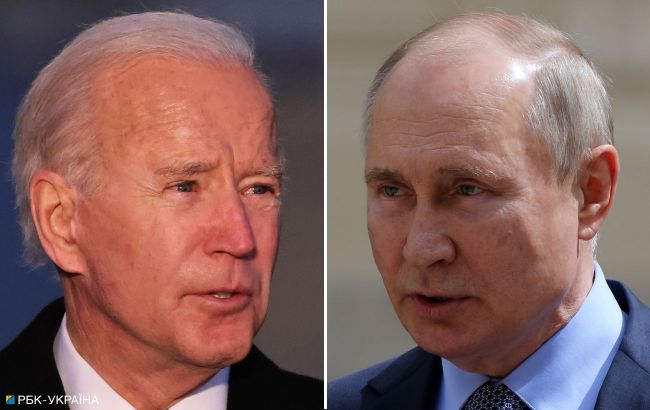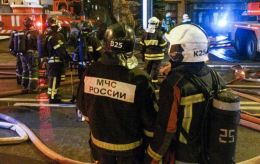USA vs Russia: Will sanctions against Gazprombank stop gas flows and Russia's military machine
 Photo: Joe Biden's administration finally decided to “annoy” Putin even more (RBC-Ukraine collage)
Photo: Joe Biden's administration finally decided to “annoy” Putin even more (RBC-Ukraine collage)
The US Treasury Department has expanded sanctions against Russia. They affected Gazprombank in particular, which accepts payments for gas from Europe and is also a conduit for the purchase of military equipment and payments to the Russian military.
RBC-Ukraine's article explains why the bank is on the blocking list now, how it will affect gas exports, and whether it can undermine Russia's ability to wage war.
USA vs Russia. Will sanctions against Gazprombank stop gas flows and Kremlin's military machine
Contents
- Sanctions against Gazprombank: Details
- Will sanctions against Gazprombank stop exports to Europe?
- Will it undermine Russia's ability to fight against Ukraine?
Sanctions against Gazprombank: Details
After the start of the full-scale invasion of Ukraine, Western countries imposed sectoral sanctions against Russia, froze the central bank's assets by $300 billion, and cut off the international payment system SWIFT.
But it was only in the third year of the war that Gazprombank, the largest bank that had not previously been subject to the harshest sanctions, was blacklisted. The sanctions include blocking restrictions, namely isolation from the dollar system.
Since spring, Gazprombank has been used to make ruble payments for gas to so-called unfriendly countries. In addition, military equipment is purchased through the bank, and salaries are paid to soldiers, including combat bonuses, and compensation to the families of those killed in the war against Ukraine.
According to the US Treasury Department, sanctions against this bank and dozens of other financial institutions and officials will further weaken Russia's military machine. The US Treasury also issued a warning about the risk of sanctions for foreign banks that join the Russian financial messaging system (SIFT, an alternative to SWIFT).
As a result, foreign banks stopped servicing cards of the Chinese payment system UnionPay issued by Gazprombank. The cards stopped working in 16 countries, including Kazakhstan, Türkiye, Hungary, Greece, and Egypt. The ability to issue a UnionPay card (the only option for payments abroad) has disappeared from the bank's website, and the application has been removed from the AppStore.
Gas prices in Europe hit an annual high of $538 per thousand cubic meters. Slovakia is assessing the potential impact of the sanctions against Gazprombank on the country, and Hungary has already announced that it is working to resolve the problem. Both countries buy Russian pipeline gas.
National Bank of Ukraine head Andrii Pyshnyi called the package one of the most ambitious. “Each of its points is the result of tireless negotiations between the Ukrainian team and the US sanctions team,” he wrote on Facebook.
He also pointed out that the restrictions included subsidiaries of banks in Switzerland, South Africa, Hong Kong, Cyprus, and Luxembourg. Vladyslav Vlasiuk, the Presidential Commissioner for Sanctions Policy, believes that Russia's financial system will soon be shocked. According to him, Moscow will try to shift payments to small banks, but this will only slow down, but not prevent the storm.
“That's why I think Ms. Elvira (Russian Central Bank head Elvira Nabiullina - ed.) hasn't been sleeping well for the last few days,” he added.
Will sanctions against Gazprombank stop exports to Europe?
New sanctions against Russia could close the only way for European customers to pay for gas supplies and bring Moscow closer to Beijing's orbit, Reuters reports. It is not yet known whether it will be closed, and Deputy Energy Minister Pavel Sorokin refused to comment on whether Gazprombank will continue to receive payments from Europe.
The sanctions include a period of curtailment of operations involving Gazprom until December 20, 2024, and operations related to the Sakhalin-2 oil and gas project until June 28, 2025. The Japanese government considers it important for its energy security.
The United States kept the loophole open until recently, as the bank played a key role in the energy market, Bloomberg writes.
Now the sanctions increase the risk of a complete cessation of Russian gas flows to Europe. The need for exemptions for Gazprombank has weakened after European countries increased their supplies of liquefied natural gas from the United States. This country is already the largest supplier of LNG to Europe, but imports from Russia remain in second place.
Starting in 2022, Moscow required European countries to pay under a scheme that converts their currency into rubles. Buyers had to open two accounts at Gazprombank: one in rubles and one in foreign currency. Poland and Bulgaria refused and were cut off from supplies, while Hungary and Slovakia still received gas. But apparently, now they need to look for another intermediary.
Hungarian Foreign Minister Péter Szijjártó called the US sanctions an attack on Hungary's sovereignty. In response to a Bloomberg request, his ministry said it would continue to provide energy supplies regardless of external pressure.
In theory, Putin could allow gas payments to be made through other banks. But it remains to be seen whether Moscow will want to change the scheme of transfers, particularly abroad.
Florence Schmitt, an energy strategist at Rabobank in the Netherlands, stated that there is a possibility of some transactions being disrupted due to this, potentially leading to delays and even a reduction in gas supplies. She noted that Gazprombank continues to play a significant role in processing payments for Russian gas exports to Europe.
According to her, delays or interruptions in supplies could affect prices in Europe and close the already narrow window of opportunity for any transit of Russian gas through Ukraine in the new year.
Will it undermine Russia's ability to fight against Ukraine?
According to US National Security Advisor Jake Sullivan, the new sanctions are aimed at further undermining Russia's ability to use the international financial system to support its war against Ukraine.
US Treasury Secretary Janet Yellen made a similar statement. She stated that these sweeping actions would make it more challenging for the Kremlin to evade US sanctions and to finance and equip its military.
The outgoing administration likely decided to finally strike a sanctions blow to support Ukraine in anticipation of pressure from President-elect Donald Trump on both sides to negotiate a peace or ceasefire.
Trump's return to the White House in January and his promise to end the war as soon as possible raised concerns among Ukraine's Western partners, who are interested in Ukraine's strong position. At the same time, the Kremlin says it is ready to discuss a potential ceasefire taking into account the realities on the ground.
Daniel Fried, a former coordinator for sanctions policy at the US State Department, explained that in its final weeks, the Biden administration had been hastily working to impose additional sanctions while simultaneously taking steps to send more weapons to Ukraine, including anti-personnel mines, and to remove barriers by lifting restrictions on the use of ATACMS.
Despite this, in recent days, Moscow has intensified its strikes against Ukraine and even demonstratively used an intermediate-range ballistic missile. And the previous rounds of sanctions over the past two and a half years have failed to critically undermine Russia's ability to wage war.
According to Fried, sanctions against Gazprombank and other banks could make it harder to sell gas and oil, possibly forcing Russians to resort to weaker currencies (not the dollar, euro, or pound sterling) or even barter deals.
The expert added that while the sanctions were unlikely to deal a decisive blow to the Russian economy on their own, they would be insufficient if they represented the final measures of the Biden administration, considering the gravity of the war and Russia's successes on the battlefield. However, the expert expressed optimism, noting that these were not expected to be the administration's last sanctions against Russia.
Sources: statements of the US Treasury Department, publications of Reuters, Bloomberg, Voice of America, and Atlantic Council.

